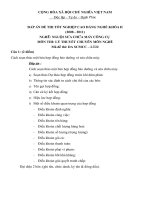PASSAGE 22
Bạn đang xem bản rút gọn của tài liệu. Xem và tải ngay bản đầy đủ của tài liệu tại đây (33.37 KB, 2 trang )
PASSAGE 22
In Viet Nam festivals often take place during the three months in spring and in autumn when people
have a lot of leisure time. In addition, the climate in spring and autumn is especially suitable for holding
festivals and for festivals goers to enjoy.
Traditional festivals constitute a form of cultural activities, a spiritual product which the people have
created and developed during the course of history. From generation to generation, the Vietnamese people
preserve the fine tradition of “remembering the source while drinking water.” Festivals are events
which represent this tradition of the community as well as honor the holy figures named as “gods” – the
real persons in national history or legendary persons. The images of gods converge the noble
characteristics of mankind. They are national heroes who fought against foreign invaders, reclaimed new
lands, treated people, fought against natural calamities, or those legendary characters who affect the
earthly life.
Accordingly, first and foremost, festivals are events when people pay tribute to divinities that rendered
merits to the community and the nation. These are occasions when people come back to either their
natural or national roots, which form a sacred part in their mind. Furthermore, festivals represent the
strength of the commune or village, the local region or even the whole nation. Worshipping the same god,
the people unite in solidarity to overcome difficulties, striving for a happy and wealthy life.
Moreover, festivals display the demand for creativity and enjoyment of spiritual and material cultural
values of all social strata. Festivals become a form of education under which fine traditional moral values
can be handed from one generation to the next in a unique way of combining spiritual characters with
competition and entertainment games.
Festivals are also the time people can express their sadness and worries in a wish that gods might
bestow favor on them to help them strive for a better life.
(Adapted from: Overview of Traditional Festival – Vietnam, Country and People)
Question 1. What affects the time to hold festivals in Vietnam?
A. Festival holders’ timetable and festival goers’ preference.
B. The abundance of fruits and flowers and people’s health.
C. Weather conditions and people’s working pattern.
D. People’s preference of leisure time and climate.
Question 2. Which of the followings best replace the word “course” in the second paragraph?
A. lesson
B. road
C. creation
D. development
Question 3. What does the author mean by saying “remembering the source while drinking water?”
A. Appreciating the contributing of national heroes
B. Only drinking water of clear production sources
C. Forgetting the outlet as the source is more important
D. Comparing the number of gods to the amount of water
Question 4. What does the word “they” in the second paragraph refer to?
A. Images
B. Gods
C. Characteristics
D. Invaders
Question 5. Which of the following is NOT mentioned as a value of festivals?
A. Remembering national heroes
B. Educating young generations
C. Showing community’s union
D. Questioning personal bad lucks
Page 1
Question 6. According to the passage, which of the following is NOT found as a common activity in
festivals?
A. Entertaining
B. Fortune- telling
C. Praying
D. Worshipping
Question 7. What is the best title of the passages?
A. Time, formation and meaning of traditional Vietnamese festivals
B. Social, educational and historical values of Vietnamese festivals
C. Similarities, differences and changes in Vietnamese festivals
D. When, how and why festivals in Vietnam keep their traditions
ĐÁP ÁN
1-C
2-D
6-B
7-A
3-A
4-B
5-D
Page 2









